January 14, 2006
Metropolis
Year: 1927
Directed by: Fritz Lang
Written by: Fritz Lang (Script), Thea von Harbou (Novel, Script)
Degree of Cyberpunk Visuals: High
Correlation to Cyberpunk Themes: Very High
Key Cast Members:
- Maria (cyborg): Brigitte Helm
- Johhan ‘Joh’ Fredersen: Alfred Abel
- Freder Fredersen: Gustav Fröhlich
Rating: out of 10
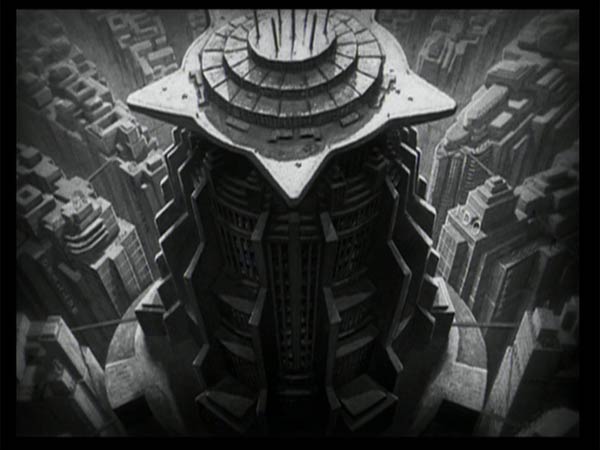
Overview: Most people probably think cyberpunk started in US in the early 80s. I say it started in Germany in 1927. Metropolis all but disapeared after its initial release, but slowly gained a following in drops and drabs, and then with the early 80s restorations, it began to truly take hold in the minds of most as something special in movie making history. Is it a coincidence that Metropolis gained prominence right around the same time as the cyberpunk movement took hold? I think not. If you’re interested in seeing the first movie with replicants, use of computers, cybernetic body parts, full corporate control over society, a robust underground, and a massively negative impact of technology on society, look no further than Fritz Lang’s expressionist masterpiece, Metropolis. You think not? Hopefully my review will sway your opinion.
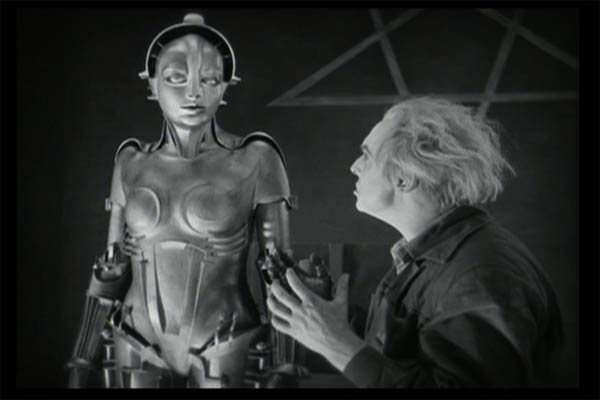
The Story: Metropolis takes place in an extreme dystopic future where a society is clearly divided into the workers and the elite. The elite live above ground in this truly wonderful city called Metropolis that has gardens, fascinating architectures, advanced transport systems and sinful night clubs. The workers live underground, in a dreary non-distinct, undifferentiated set of buildings. Their whole existence centers around keeping the machinery going that powers Metropolis.
Johhan Fredersen, the corporate CEO, does not see the workers as people, but instead sees them as no more than specialized parts in his grand, clockwork-like machinery. This point is struck home in that the workers life is organized in 10 hour shifts. They work 10 hours on, than have 10 hours off. In other words, their sense of time is not dictated by night and day as it is in metropolis - they live underground so they rarely if ever see the sun. Their time and life is fully guided by the needs of the machinery - the 20 hour days ensure they are fully disconnected from anything natural.
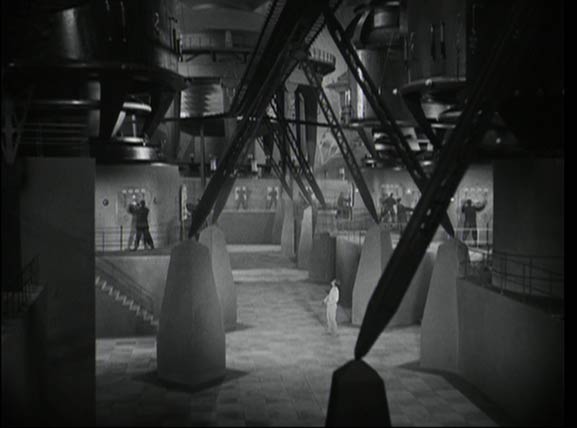
In this world, the son of the corporate CEO (Johhan), Freder, accidentally is exposed to and falls in love with Maria, a woman who has made it her mission to give hope to the working class. Freder takes the role as a working class member and pursues her down to the underground city and takes the role of working class member. While there, he works a grueling 10 hour shift in the factory, and begins to understand the inhumane way they are treated. He later attends a secret meeting in the catacombs where Maria is giving hope to the working class through spreading the word of peace and Christianity.
Unfortunately, Johhan finds out about this worker uniting, and wants to stop it. He does so by enlisting the aid of a mad scientist named C.A. Rotwang. Johhan asks Rotwang to create a replicant of Maria and schemes to replace her in order to incite the workers into revolt so that Johhan can crush the leaders. The story progresses from here, but the short of it involves betrayal, romance, action and suspense.
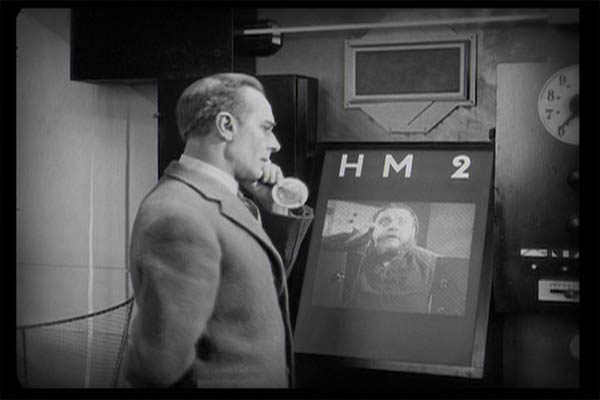
Futuristic Thoughts: While Metropolis was made prior to the computer age, its interesting that the idea of gauges and governors for machines, and a central machine that combines all the inputs and provides it to the executive is already envisioned. A never ending stream of information is sent to a control panel in Johhan’s wall that gives him a constant stock market-like update of the status of the machine. Additionally, Johhan has instant access to anywhere on the job floor by a videophone. In short, Johhan has instant access to the workings of his machine whenever he wants.
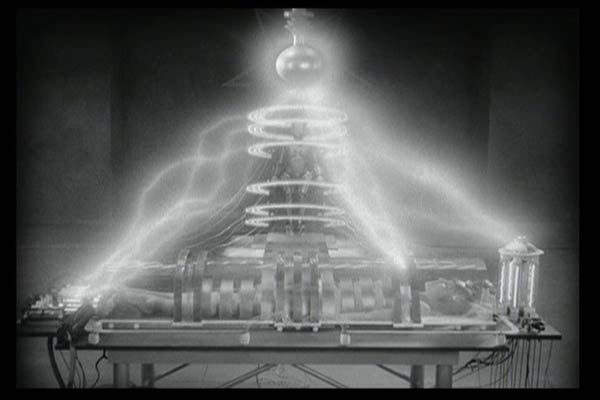
Cyberpunk Visualized: The Replicant C.A. Rotwang modifies to turn into Maria required that the real maria be captured so that her “essence” could be transferred to the robot. By a process unexplained, the robot then has its outside appearance modified to “become” a replicant of Maria. This, in essence, is the precursor to the storyline in Ghost in the Shell: Innocence, where real humans have their ghosts copied and transferred to android dolls. Because Maria’s “ghost” has been replicated into this android, the evil android Maria exudes sexual energy to the point that she instantly enchants the entire worker city and incites them to rebellion.
In this scene above, we see that energy and information are almost synonymous. Maria’s ghosted soul is being transferred into the evil Maria android. And here all this time, I mistakenly thought Frankenstein originated this look! Truly, C.A. Rotwang’s laboratory would have worked perfectly for Dr. Frankenstein.
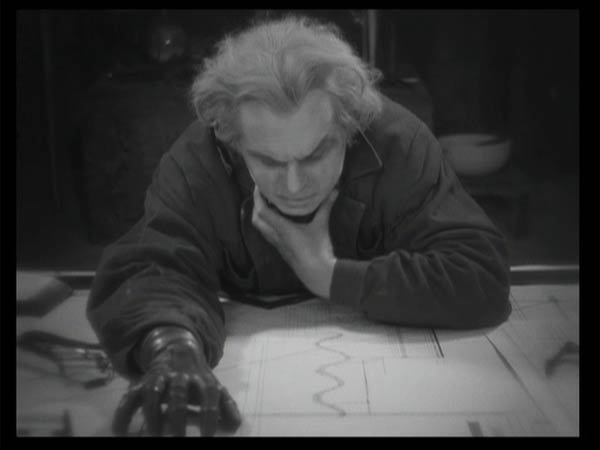
C.A. Rotwang, the evil scientist, has a prosthetic hand that functions as a real hand. He has effectively merged his machinery with the human mind to allow it to function as a part of him. While the word cybernetic body part has not yet been invented yet, the implication is clear - in Metropolis, where machines dominate all aspects of life, it is indeed possible to replace body parts with cyborg limbs.
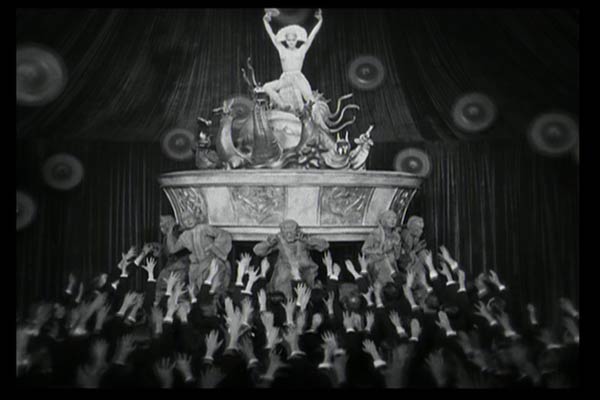
In short, Metropolis portrays a technology-driven culture that devalues and devolves the humanity of the workers, while at the same time, allows the elite to lead perverse and sinful lives. The technology strips us of our humanity both in removing us from a natural existence, integrating us as replaceable parts in a machine, and even allows us to replace people with Replicants!
The Bottom Line: So OK, fine, its possible to look at Metropolis as a cyberpunk film. So why watch it? Answer - because its a terrific movie! If you get the Kino version (you MUST!!! the other cheaper versions don’t follow Lang’s script), you will be viewing a masterpiece of early cinema. Metropolis has replaced Passion of Joan of Arc (Dreyer, 1928) as my favorite silent movie. And truly, its influence on the cyberpunk movie genre is surpassed by only one film. If you get this, you won’t be disapointed.
Comments
January 16, 2006
SFAM said:
Incidentally, there is a great site out there that talks about how Metropolis is really the first cyberpunk movie:
Metropolis - An alternate reality sourcebook for Cyberpunk 2020
March 15, 2006
Reinhold Keiner said:
Following Weblog informs about the scriptwriter Thea von Harbou:
http://medienberatung.blogspot.com
There is also a tillage-possibility for a book about the author.
SFAM said:
Hi Reinhold Keiner, welcome to cyberpunkreview
Based on your name link to the same site, I am guessing this is your weblog? If so, best of luck on writing the book! And wow, Thea von Harbou sounds like an incredible person - writing scripts from the 1920s to the 1950s. So she came up with the main idea for Metropolis, and not Lang, is that correct?
BTW, for you non-german speakers (like me), you’ll probably need to take Reinhold’s site through a translator before you can read it.
March 16, 2006
DannyV said:
I remember the first time I saw this movie and how blown away I was by the fact that this is a(now) 79 year old movie. Its visuals and story were truly ahead of their time.
And incidentally, I think many of the best cyberpunk films and anime were influenced by not only film noir, but also German impressionism, as evidenced by the stylish use of shadows and many surreal landscapes.
SFAM said:
That’s a great point DannyV. Cyberpunk visuals have definitely been influenced by Metropolis and thus, German impressionism in general - which also influenced Noir. Shadows and surreal landscapes are definitely big in cyberpunk.
June 23, 2006
Dixie Flatline said:
Quick correction: It is German Expressionism you guys are talking about, not Impressionism.
SFAM said:
Hi Dixie, agreed. Definitely expressionalism (as I state in my overview), not impressionism (what we called it in the discussion comments). Thanks for the correction.
November 8, 2006
Bo said:
Any plans on reviewing the anime metropolis? is loosely based on this one and is the best animated movie i have ever seen.
November 11, 2006
SFAM said:
Hi Bo, I reviewed the anime already - I loved it:
http://www.cyberpunkreview.com/movie/decade/2000-current/metropolis-2001/
January 2, 2007
hicham salouah said:
not bad is goooooooood
hicham salouah said:
www.superxman007.skyblog.com
is gooooooood
January 9, 2007
hicham salouah said:
is good thanks
January 15, 2007
Tom Simms said:
fantastic movie really enjoyed it
April 23, 2007
Right Wing Nut House » SHERYL CROW IS ABSOLUTELY SPOT ON said (pingback):
[…] But this second toilet appeared to contain enough differences that I felt a thorough investigation was called for. There appeared to be some kind of bizarre structure to the metal assembly at the bottom of the bowl. I didn’t think it was some kind of fancy drain but for the life of me, I couldn’t figure out just what function the strange grouping of what appeared to be towers and bars might be for. It looked like a miniature from the set of Metropolis. […]
May 23, 2007
neofilip said:
this is one good move
it is exelent
imam ovaj film ako treba nekome ko razume ovaj jezik i zivi u blizini
June 25, 2007
Mr. Roboto said:
Has anyone heard of a Charlie Chaplin film called Modern TImes? I’ve only seen bits and pieces, such as Chaplin being fed by machine and being moved through a machine in a cartoonish manner, but it looks like it may have been inspired by Metropolis. At lest, it was Chaplin’s statement against the depression-era use of machinery.
SFAM said:
Has anyone “heard” of this? Um, yeah, although I haven’t watched it in the last a few months.
Yes, the whole machinery thing is there, but its first and foremost a Chaplin movie (meaning its a riot! - Gold Rush is my favorite of his, but I have most of them). And while it wouldn’t be a stretch to say that Metropolis probably influenced Modern Times, Modern Times spent far more attention to the assembly line than Metropolis. Sort of how Metropolis gives you the big picture, Modern Times focuses on one guy’s plight in this system (one guy who engages in an extreme amount of slapstick!).
June 27, 2007
Spaceball said:
SFAM said:
Hi Spaceball, great post! Incidentally, to me, Kino stands for “Excellent quality silent DVD transfers.”
And yeah, M is definitely worth getting as well.
August 5, 2007
joe-cool said:
hello good friends,
this is probly one of my fav. movies id have to say.
i dont realy know about it being much of a cyberpunk flick but it is and probly will be known as the greatest science fiction flim out there.
it has been known to keep its own against alot of these modern scifi flicks.
March 20, 2008
Anonymous said:
DUM
\
JEREMY said:
THIS IS SO COOL!
July 3, 2008
SSJKamui said:
According to the german article http://www.zeit.de/online/2008/27/metropolis-vorab?page=1 ,
in a museum in Buenos Aires, they found a copy of the lost uncut version of the film.
Zhal said:
http://www.thelocal.de/12847/20080702/
That one about the uncut version is in English.
July 10, 2008
maireth said:
ustedes son los mejores y guapisimos y es pero que agan una version en español
December 18, 2008
Katalyst said:
Absolutely stunning and amazing! This movie must have been so far ahead of its time when it was made. This one really got me thinking and I am amazed that such a masterpiece could have been created so long ago. Truely, a jewel that has been lost in time.
January 31, 2009
jmm1233 said:
This is Cyberpunk
March 14, 2009
Mr Absence said:
It hadn’t occured to me that I should watch this film before, but after reading this review, it seems stupid not to!
“And truly, its influence on the cyberpunk movie genre is surpassed by only one film.”
Which film?
June 8, 2010
Cyberpunk Review » The Long Tomorrow said (pingback):
[…] Metropolis had these city scenes some fifty years earlier! Did Gibson and Scott ever see Metropolis? […]
June 13, 2010
ShadowGunner49 said:
I’m really happy that a new generation is finding silent movies again. Of my favorite silent movies, I would definitely put this on it including THE GENERAL AND THE PASSION OF JOAN OF ARC.
December 13, 2010
andamios said:
Metropolis features special effects and set designs that still impress modern audiences with their visual impact – the film contains cinematic and thematic links to German Expressionism, though the architecture as portrayed in the film appears based on contemporary Modernism and Art Deco. The latter, a brand-new style in Europe at the time, had not reached mass production yet and was considered an emblem of the bourgeois class, and similarly associated with the ruling class in the film.
SSJKamui said:
I know about german expressionism and I think their topics “madness, war, giant cities” etc. preceded many of the typical stylistic elements of Cyberpunk.
December 29, 2010
International Giant said:
No words to describe. Phenomenal.
September 27, 2011
ISO 3166-2:f-i said:
saw this very long silent movie ,not really a fan of the old movies. but it was so terrific i couldnt believe ! i wanna own a copy!